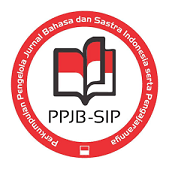KEMAMPUAN GURU DALAM PENYUSUNAN EVALUASI PADA PEMBELAJARAN TEKS EKSEMPLUM BERDASARKAN KURIKULUM 2013 SISWA KELAS IX DI SMPN 1 BANJAR
DOI:
https://doi.org/10.23887/jjpbs.v5i3.8767Abstract
Penelitian ini bertujuan (1) mendeskripsikan kemampuan guru dalam menyusun evaluasi berkaitan dengan sikap, pengetahuan, dan keterampilan pada pembelajaran teks eksemplum siswa kelas IX di SMPN 1 Banjar. (2) mendeskripsikan kemampuan guru dalam membuat evaluasi sesuai dengan indikator pada pembelajaran teks eksemplum siswa IX di SMPN 1 Banjar. (3) mendeskripsikan kendala-kendala yang dihadapi guru dan cara mengatasinya dalam menyusun evaluasi pada pembelajaran teks eksemplum siswa kelas IX di SMPN 1 Banjar. Penelitian ini menggunakan rancangan deskriptif kualitatif. Subjek dalam penelitian ini adalah guru bahasa Indonesia di kelas IX SMPN 1 Banjar. Objek penelitian ini adalah penyusunan evaluasi pada pembelajaran teks eksemplum berdasarkan kurikulum 2013. Metode yang digunakan dalam penelitian ini adalah metode observasi, dokumentasi dan wawancara. Penelitian ini menggunakan teknik analisis deskriptif kualitatif. Data dianalisis dengan langkah sebagai berikut: mengumpulkan data, menyeleksi data, menyajikan data, dan menyimpulkan. Hasil penelitian ini menunjukkan ada beberapa hal yang menonjol terkait dengan masalah yang diangkat, yakni (1) kemampuan guru dalam menyusun evaluasi berkaitan dengan kompetensi sikap, pengetahuan, dan keterampilan pada pembelajaran teks eksemplum siswa kelas IX di SMPN 1 Banjar. (2) kemampuan guru dalam membuat evaluasi berdasarkan dengan indikator pada pembelajaran teks eksemplum siswa kelas IX di SMPN 1 Banjar. (3) kendala-kendala yang dihadapi guru dan cara mengatasi kendala-kendala dalam menyusun evaluasi pembelajaran teks eksemplum siswa kelas IX di SMPN 1 Banjar.Kata Kunci : Kata Kunci: Evaluasi, teks eksemplum, dan Kurikulum 2013.
This study aims to (1) describe the ability of teachers in preparing the evaluation deals with the attitudes, knowledge, and skills in the learning text eksemplum class IX students at SMPN 1 Banjar. (2) describe the teacher's ability to make an evaluation according to the indicators on text learning eksemplum IX student at SMPN 1 Banjar. (3) describe the obstacles faced by teachers and how to overcome them in preparing an evaluation of the instructional text eksemplum class IX student at SMPN 1 Banjar. This study used a qualitative descriptive design. Subjects in this study is the Indonesian teachers in class IX SMPN 1 Banjar. The object of this study was the preparation of the evaluation of the learning curriculum-based text eksemplum 2013. The method used in this research is the method of observation, documentation and interview. This study used a qualitative descriptive analysis techniques. Data were analyzed with the following steps: collecting data, selecting the data, presenting data, and concluded. The results of this study indicate there are some things that stand related to the issues raised, namely (1) the ability of teachers in preparing the evaluation of attitudes related to the competence, knowledge and skills on text learning eksemplum class IX students at SMPN 1 Banjar. (2) the ability of teachers to make an evaluation based on the indicators on text learning eksemplum class IX student at SMPN 1 Banjar. (3) the constraints that teachers face and how to overcome obstacles in preparing the text eksemplum learning evaluation class IX student at SMPN 1 Banjar.
keyword : Keywords: Evaluation, eksemplum text, and Curriculum 2013.
Published
2016-11-03
Issue
Section
Articles
License
Authors who publish with the Jurnal Pendidikan Bahasa dan Sastra Indonesia Undiksha agree to the following terms:- Authors retain copyright and grant the journal the right of first publication with the work simultaneously licensed under a Creative Commons Attribution License (CC BY-SA 4.0) that allows others to share the work with an acknowledgment of the work's authorship and initial publication in this journal
- Authors are able to enter into separate, additional contractual arrangements for the non-exclusive distribution of the journal's published version of the work (e.g., post it to an institutional repository or publish it in a book), with an acknowledgment of its initial publication in this journal.
- Authors are permitted and encouraged to post their work online (e.g., in institutional repositories or on their website) prior to and during the submission process, as it can lead to productive exchanges, as well as earlier and greater citation of published work. (See The Effect of Open Access)







